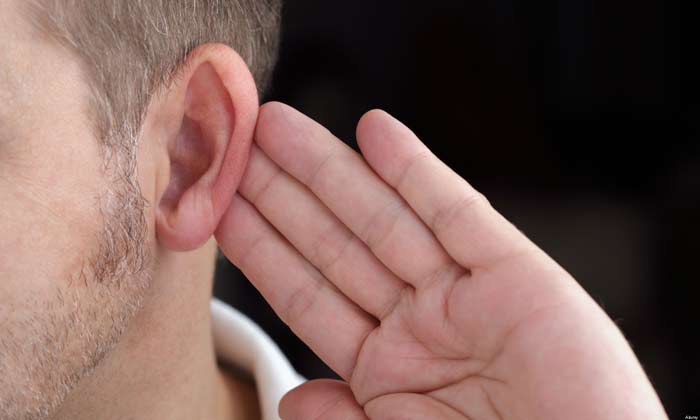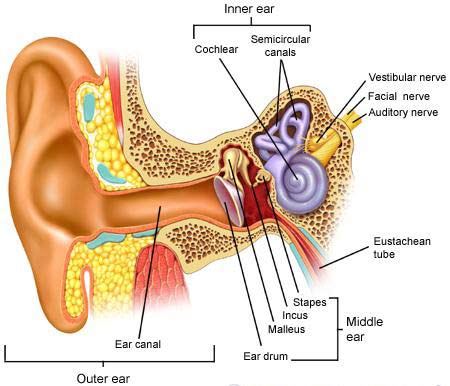Fluttering in ear is one of the unusual conditions that at least a good number of people have had to deal with. Everyone can admit that it is scary not only to experience but also imagine of these strange sounds in eardrum. Find out what noise means, causes, symptoms and how to get rid of it.
Fluttering in ear Meaning
Fluttering in the ear refers to a condition in which you hear a sound in the ear that magnifies with time. At the beginning, the sound may be harmless, however; when not treated in its early stages it may turn out to be serious and very harmful to your health.

Ear fluttering
This fluttering of the ear is described by the medical term Tinnitus. The character of this condition is very important for you or your health adviser to determine its cause.
Tinnitus is classified into two;
Subjective tinnitus
For this type, the condition is temporary and only occurs for a short period of time. Most people are affected by this type of tinnitus. This may be caused by disruption in the functioning of your hearing nerves or part of the brain which interprets the signals sent to it as noise.
Objective tinnitus
Objective tinnitus is very rare and it’s experienced for a long period of time. During evaluation, your specialist might be in a position to hear the sound from the ear. Mostly, it is as a result of muscle contraction in the ear or damages in the blood vessels.
Despite the noise being irritating and annoying, it causes little or no complications to your health.
According to Mayo Clinic, tinnitus is not a sign of something serious. Despite this, it can change with time to a serious issue due to increased age which is accompanied by loss in the hearing effects, injuries in the ear or a problem in the functioning of the body’s blood circulatory system.[1]
In addition, the sound may sometimes have the same and constant rate with your heartbeat and breathing. In other cases, it may lapse after a short time.
Symptoms of Fattering Sound/Noise in Ear
There are signs that may indicate that you are likely to be suffering from ear fluttering. Experiencing this condition is not only disturbing when carrying out your work but also brings about mental stress since the sound keeps on increasing its magnitude. Some of these symptoms are as discussed below;
Stress
Psychologically stress is a feeling of strain and pressure especially in the brain. Small stress is healthy for your life but when in excess it might cause great harm to you bringing about depression.
Stress may therefore be an indication that you are suffering from tinnitus. In most cases this stress is usually as a result of fear of tinnitus. [2]It is advised that you seek medical attention when you experience much stress since it might be a sign of more serious case such as objective tinnitus.
Ringing in the ears.
This refers to hearing of sounds in the ears when there is no other source of sound around you. This sizzling noise may occur in one ear or both and are constant. These sounds may worsen and may not go away permanently despite all efforts put if left untreated.
Ear pain
Ache in the ear in most cases is an indication of tinnitus. The pain is experienced mainly in the ear drum which can be as a result of muscle contraction in the ear. When vibrations occur, mostly as a result of the produced noise, they lead to contraction and relaxation of muscles. Eventually this causes the pain leading to tinnitus.
Depression
Depression refers to a mental health disorder that is often characterized by persistent loss of interest in activities. This, in most cases may cause interruption of your daily routine duties leading to impairment in daily life.

The persistent feeling of sadness is due to much thinking about the cause of the sound inside your ear. This often distracts you from doing other chores of interest in your life. Depression may be a major problem in your life if not dealt with during its early stages.
Reduced hearing.
Additionally, when you suffer from objective tinnitus, the auditory nerves may eventually be damaged. When this happens, you experienced a lot of difficulties especially when trying to listen to noise or sounds of small magnitudes.
Moreover, under extreme conditions of tinnitus you may become partially impaired due to the noise.
Difficulty sleeping
Objective tinnitus causes lack of sleep since the foreign noise is very distracting. It can also cause lower quality of life.
Anxiety
This refers to a condition that is marked by feelings of worry, restlessness and fear. For this a case, panic attacks experienced by the roaring sound as a result of tinnitus makes you anxious, developing fear that is intense enough to cause interference in your activities.
Ear Fluttering/Ringing Causes
Thyroid
Thyroid is a butterfly shaped organ positioned just below your neck. In addition, it is a very crucial gland of your system that influences most metabolic processes in your body through the production of hormones. [3]
This gland uses iodine from food you consume to form the hormones which are then released into the blood stream and eventually to the body cells. When the hormones are too high you suffer from a condition known as hyperthyroidism whereas hypothyroidism occurs when number of thyroid hormones produced is low.
Additionally, the dysfunction of the thyroid glands may cause increased sensitivity to pain, depression and tinnitus. On the other hand, studies show that during treatment for thyroid cancer you may also experience tinnitus and hearing loss.
Anxiety
Research and studies have shown that despite that tinnitus can cause anxiety and stress; the condition can be worsened by anxiety. I n most cases, individuals with anxiety experience increase in the roaring sound in the ears.
According to research, about 16 million persons of the United States suffer from tinnitus that destructs their activities hence required to seek medication to treat the condition. It is suggested that anxiety causes pressure on the nerves and blood floor which eventually leads to hissing sounds in the ears.
Ear spasms
This refers to a situation whereby myoclonuses occur in very small muscles behind the eardrum and just in front of the cochlea.[4] Myoclonus is usually caused by an abrupt or slow contraction of muscles especially when asleep.
Myoclonuses usually develop as a result of response to infection or injury in the spinal cord. Sometimes this may also occur due to lack of sufficient oxygen in the brain cells.
When a tensor tympani muscle; which is located in a bony canal above the auditory tube, is in spasm, it forms a roaring sound which can be heard by the person next to you. This causes a serious case of objective tinnitus.
Blood pressure
Blood pressure refers to the extent of impact of the blood going through your body on the walls of the blood vessels. Generally, this is the common cause of tinnitus. Apart from blood pressure, there are other blood vessel problems that are linked to noise in the ears.
Hypertension which is a condition of increased blood pressure and factors that cause high blood pressure such as alcohol are great causes of noise in the ears. Additionally, tumors on the head and neck may grow bigger and eventually press the walls of your blood vessels therefore leading to fluttering ears.
Moreover, cholesterol builds-up in the blood vessels, turbulent blood flow and deformed capillaries may cause change in blood pressure hence tinnitus.
Dizziness
This is a feeling of spinning and losing your balance experienced in the brain. In most cases, this is caused by an inner ear disorder known as Meniere’s disease. It causes pain in the ear and severe cases of dizziness in which you feel like you are spinning.
In addition to this, you will suffer from hearing loss and hearing of roaring noise. Sometimes the hearing loss may go to an extent of being permanent. The disease also causes unusual inner ear fluid impact on the cell’s wall.
Dizziness is also as a result of using drugs which are harmful to the ear. This will cause hissing sounds in the ear but the sounds are less harmful.
Other causes
Apart from the factors discussed above; there are other conditions that cause noise in the ear. These include the following;
Sinus infection
Sinus is a condition whereby the cavities near the nasal passage become infected by bacteria. Occasionally, this is triggered by either cold or allergies leading to headache, facial pain and a running nose.
Chronic sinusitis goes away after some day but for the case of acute sinusitis you require to undergo medication.
The nasal blockage can cause unexpected pressure in the middle ear which is as a result of fluid that fills your sinuses. Often this leads to hearing of sounds that are not from any external sources.
Moreover, the pressure cause nausea, dizziness and create headaches.
Alcohol intake.
If you drink alcohol it’s likely that you experience hallucinations especially on stopping the intake. Moreover, on withdrawal from the act of drinking alcohol you may develop tinnitus, hearing of audible noises.
Age
When you grow old, mostly at the age of 60 your hearing worsens. In some cases, you experience noise in the ear that is not from any external sources. Tinnitus is very common in old men.
Yawning
The chewing muscles located near the middle ear muscles when you yawn they cause contraction in the muscles of the ear causing fluttering of the ear. Moreover, there is a connection between ligament of the jaw and those of the hearing bones in the middle ear which on yawning cause noise in the ear.

How to get rid & Treatment Options
In most cases as earlier mentioned, fluttering of the goes away by itself but if the condition worsens its advised you seek treatment. The treatment options are as follows;
Controlling blood pressure
If you are suffering from high blood pressure, you are advised to have a healthier diet with small amounts of salts. Additionally, frequent exercise and medication can help you lower blood pressure. Vasodilator and Calcium channel blocker are excellent medication for lowering blood pressure.
Change in eating habits.
It’s advised that you eat healthy foods that are free from cholesterol to avoid blockage of the blood vessel which can cause changes in blood pressure.
Drinking the required amounts of water which is six to eight glasses for an adult will make your skin remain hydrated. This will prevent muscle cramps in the neck and shoulders which may cause tinnitus.
Recent studies show that consumption of required amounts of magnesium and calcium plays a big role in preventing causes of fluttering in the ear. An adult requires 310mg of magnesium and 1000mg of calcium daily for a healthy living.
Adopting better lifestyle.
You are advised to have enough sleep so as to reduce stress, a common cause of tinnitus. An adult should sleep for at least 8 hours per day.
Biofeedback is an excellent way of controlling stress by change in body responses. Stress control techniques based on the mind may also help.
Masking
Masking refers to a situation whereby a device is used to reduce the perception of sounds in the ear. Here, you can prevent the noise by tuning on a radio or television so as to overcome the effects of the sound from the ear. Special devices such as hearing aid produce low level of noise that decreases the hearing of the hissing of the ear.
Injection of botulinum toxin
This is a neurotoxic protein produced by bacteria. When you inject it into your muscles, it prevents nerve signals from passing information to the muscle to contract. By this mechanism, it helps in reduction of muscle relaxation in the ears therefore reducing sound produced.
In a situation where you are experiencing subjective tinnitus, treatment may not be necessary but the following ideas can make you do away with fluttering ears.
You are advised to limit the intake of aspirin and other over the counter drugs. Although homeopathic drugs can also reduce the effects of noise in the ear, thorough treatment is required.
Sources
[1] https://www.mayoclinic.org/diseases-conditions/tinnitus/symptoms-causes/syc-20350156
[2] https://www.medicinenet.com/tinnitus_ringing_in_the_ears/article.htm#tinnitus_facts
[3] https://www.endocrineweb.com/conditions/thyroid-nodules/thyroid-gland-controls-bodys-metabolism-how-it-w
[4] https://www.tinnitusformula.com/library/understanding-how-middle-ear-myoclonus-causes-tinnitus
